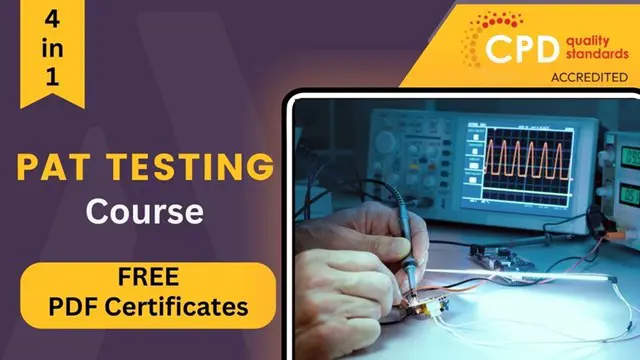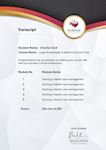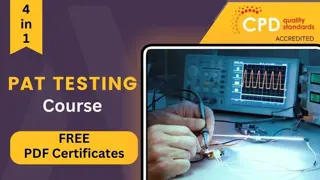
PAT Testing - CPD Certified
Save Money, Learn & Earn > 4 Premium Courses > Free CPD Certified PDF Certificate > Free Exams > Free Gifts
StudyHub
Summary
- Certificate of completion - Free
- Hard copy certificate - £8
- Exam(s) / assessment(s) is included in price
- Tutor is available to students
Add to basket or enquire
Overview
►►► Enrolment Gifts ◄◄◄ **FREE PDF Certificate** FREE Exam** Lifetime Access **Enrol PAT Testing Today**
To ensure the safety of employees and the general public, UK law mandates that businesses make sure electrical equipment in the workplace is kept in a safe condition. The best method for doing this is PAT (Portable Appliance Testing) testing. Because of this, businesses place a great value on PAT testing competence.
If you want to increase the value of your CV in the UK market, our PAT Testing course might be a huge assistance.
Everything from the fundamentals to the cutting-edge theoretical knowledge required to be successful in the related industry will be covered in this course. You will learn how to choose and examine the proper equipment, conduct pre-use inspections, operate and store equipment correctly, stay safe around fire, and respond to emergency situations in order to lessen and limit the risks associated with portable appliance testing (PAT). In addition, we will discuss the instruments for testing and equipment inspection, electrical installation testing, safety precautions, and many more.
As a landlord, electrician, or maintenance worker, the most trustworthy way to make sure you are achieving your electrical safety regulations is through portable appliance testing (PAT). PAT could be the best skill to develop, whether your goal is to become your own boss and launch a PAT business or you simply want to pick up a new ability. Since the Portable Appliance Testing (PAT) course has a well-crafted learning curriculum and modules that cover important information you need to know, it will assist you in achieving your objective.
Hope to see you inside!
Learning Outcomes
Upon successful completion of the PAT Testing course, you will be able to,
- Get an overview of portable appliance testing (PAT).
- Discover the PAT legislation provisions.
- Improve your knowledge and abilities needed for risk assessment.
- Recognise the importance of preliminary visual assessment.
- Familiarise yourself with the testing equipment.
- Learn the fundamentals of testing electrical installations.
- Gain a thorough grasp of the safety measures used during electrical testing.
- Study reporting and record-keeping procedures in detail.
This Bundle consists of the following career-oriented courses:
- ➥ Course 01: Portable Appliance Testing and Risk Assessment Training
- ➥ Course 02: Electronic Device Maintenance and Troubleshooting Course
- ➥ Course 03: Electrical Technician and Safety Training
- ➥ Course 04: Smart Meter Installer Diploma
The PAT Testing has been prepared by focusing largely on career readiness.
Certificates
Certificate of completion
Digital certificate - Included
Hard copy certificate
Hard copy certificate - £8
Hard Copy certificates must be bought separately for an extra £8.
Please Note: The delivery charge inside the UK is £3.99, and the international students must pay a £9.99 shipping cost.
CPD
Course media
Description
Course Curriculum:
**PAT Testing**
Module 01: Introduction to PAT
- What is a Portable Electrical Appliance?
- What are the risks?
- Understanding shock risk
- A little about risk assessment
- In-service Inspection and Testing Procedures
- Updated CE and UKCA Marking Regulations
- Setting Up for Appliance Testing
Module 02: Relevant Statutory Provisions for PAT
- Legislation
- Who is responsible for PAT testing?
- The long-term safety of appliances
- The Health and Safety at Work Act 1974 (HSWA)
- The Management of the Health and Safety at Work Act Regulations 1999
- The Provision and Use of Work Equipment Regulations 1998
- The Electricity at Work Regulations 1989 (EWR)
- Legal measures
Module 03: Risk Assessment
- What you need to know about risk assessments
- What is a risk assessment?
- Factors to consider during a risk assessment
- Performing a risk assessment
- Who should perform a risk assessment?
- Operatives’ obligations during risk assessments
- Risk Assessment during PAT
- The Code of Practice for In-Service Inspection and Testing of Electrical Equipment
- Issues when planning PATs
Module 04: Reducing and Controlling Risks
- Reducing risks: fire safety
- What must you do to ensure fire safety?
- Performing the fire safety risk assessment
- Itemised process of fire safety risk assessment
- Emergency procedures
- What Should Be Included in Your Emergency Procedures?
Module 05: Electrical Units and Appliance Classification
- Electrical Units
- Appliance Classification
Module 06: Initial Visual Examination
- The Choice and Different Kinds of Equipment
- Inspecting Equipment
- General Things to Look for During a Visual Inspection
- Inspecting the Equipment
- Formal Visual Inspection
Module 07: Instruments for Testing and Equipment Inspection
- Testing Instruments
- Frequency of In-service Inspection and Testing
Module 08: Electrical Installation Testing
- The Protective Conductor Continuity Test
- The Insulation Resistance Test
- Protective Conductor and Touch Current Measurements
- Ring Final Circuit Test
- Polarity Test
- Earth Electrode Testing
- Prospective Fault Current Test
- Functional Checks
- Substitute Leakage Test
- Load Test
- Flash Testing
Module 09: Safety Precautions in Electrical Testing
- Correct Selection of Protective Devices
- Test Equipment
- Electric Shock
- Testing Transformers
- Testing a 3 Phase Induction device
Module 10: Reporting and Record-keeping
- The Reporting of Injuries, Diseases and Dangerous Occurrences Regulations 2013 (RIDDOR)
- Documentation
- Labelling
- Damaged or Faulty Equipment
- User Responsibility
- Summary
Who is this course for?
- Anyone pursuing a career in the PAT industry.
- Anybody in charge of health and safety in low-risk environments such as offices.
Requirements
This PAT Testing Training was made by professionals and it is compatible with all PC’s, Mac’s, tablets and smartphones. You will be able to access the course from anywhere at any time as long as you have a good enough internet connection.
Career path
This PAT Testing course is extensively designed to benefit the following career opportunities.
- Electricians
- Maintenance Staff
- Facility Management Personnel
In the UK, the average salary of these professions ranges from £20,000 to £40,000 per annum.
Questions and answers
Are there any additional costs added to this course? For example, are there any extra costs when taking the MCQ test.
Answer:Hello Michael, No further cost is involved. You can take MCQ exam and obtain free PDF certificate without any further payment.
This was helpful.
Reviews
Currently there are no reviews for this course. Be the first to leave a review.
Legal information
This course is advertised on reed.co.uk by the Course Provider, whose terms and conditions apply. Purchases are made directly from the Course Provider, and as such, content and materials are supplied by the Course Provider directly. Reed is acting as agent and not reseller in relation to this course. Reed's only responsibility is to facilitate your payment for the course. It is your responsibility to review and agree to the Course Provider's terms and conditions and satisfy yourself as to the suitability of the course you intend to purchase. Reed will not have any responsibility for the content of the course and/or associated materials.








